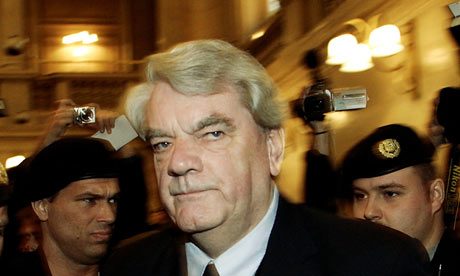
David Irving interview in El Mundo provokes Israeli anger
Guardian
08 Settembre 2009
A Spanish newspaper's move to mark the second world war anniversary with an interview with the Holocaust-denying historian David Irving has touched off a furious row with Israel, which has condemned the decision to elevate freedom of expression above ethics.
El Mundo yesterday defended its decision to publish the Irving interview, saying he was one of a series of interviewees picked because of their opinions on polemical questions left behind by the war. It said it also chose Irving, who served 13 months in an Austrian jail for denying that the Nazis murdered 6 million Jews, because he was at the centre of a wider debate about the criminalisation of opinion.
Israel's ambassador to Spain, Raphael Schutz, complained bitterly about El Mundo's decision to include Irving in a run of interviews that include the Hitler biographer Ian Kershaw and the director of the Yad Vashem Holocaust museum in Israel, Avner Shalev.
"The problem is not just the offence or the polemic, but the lack of any moral, historical or ethical judgment on the part of whoever decided to interview Irving alongside recognised experts in the matter," Schutz wrote in a letter published by the newspaper.
"The unfortunate decision to interview Irving cannot be justified in the name of freedom of expression," he said.. "It is just a reflection of the lack of ethics of those responsible, of their disdain towards the newspaper's readers, towards the other interviewees and, obviously, towards the newspaper itself."
El Mundo's deputy editor, Juan Carlos Laviana, said the paper's interviewer had been tough with Irving. El Mundo would also run a piece debunking some of the falsehoods the historian had previously peddled about the second world war and the Holocaust, Laviana said.
"He does not deny the Holocaust in the interview," said Laviana. "There is nothing in it that would be a crime in Spain."
"Irving has already paid for his crime," he added, referring to his prison spell in Austria. "That was, of course, a crime of opinion rather than of action."
Laviana said a debate was now open about whether laws in some countries against expressing certain opinions about the second world war were too harsh and should be changed.
The interview is due to be published on Saturday. In it, Irving accuses the allies of paying relatively little attention to the Holocaust until it became a major international issue, years after the war had ended, according to Laviana.
"I think they are giving Irving more importance than he really has," Laviana said of the Israelis. "They are turning him into a piece of news."
Other controversial opinions about the war expressed by El Mundo interviewees had raised no complaints, Laviana said. These included a claim by the German historian Jörg Friedrich that allied air raids on civilians in German cities amounted to murder.
Laviana said El Mundo's staff editorial committee had backed the decision to publish the Irving interview despite Israeli criticism. A letter of complaint about Irving had also been received from Shalev, Laviana said.
This is the second time that Israel has publicly taken issue with a foreign news organisation in recent weeks.
Late last month, an article in the Swedish tabloid Aftonbladet suggested that Israeli troops had harvested the organs of dead Palestinians. Israel urged the Swedish government to issue an official condemnation of the story, but the Swedes refused, citing freedom of expression.
Source > Guardian